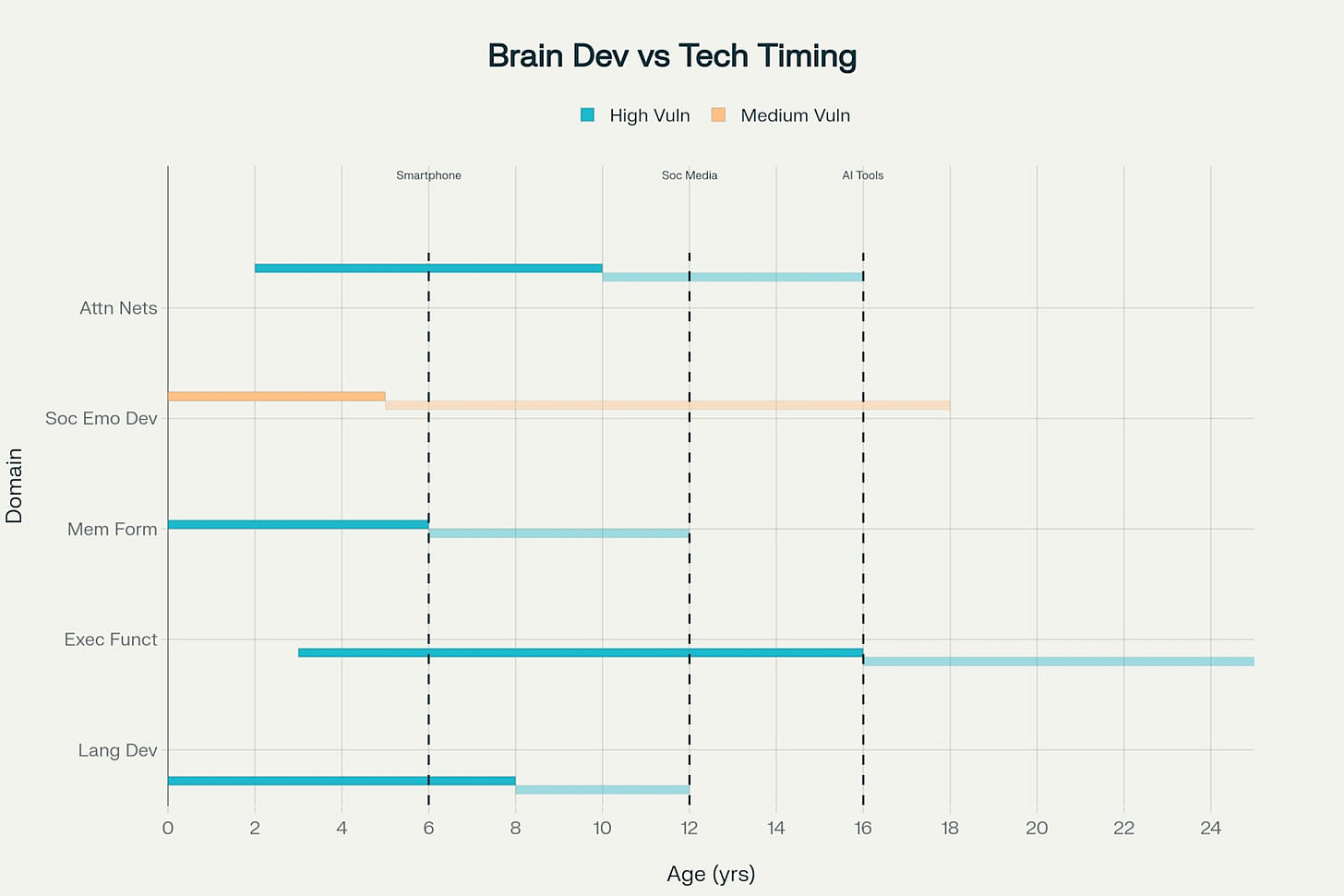A Parent's Reckoning
Last spring, I watched my daughter Liliana navigate her senior year with a toolkit I never had—and frankly, one I wasn't sure she should have. Perplexity for research. QuillBot to polish her prose. The occasional ChatGPT session when writer's block struck at 11 PM with a deadline looming.
I encouraged it. Not because I thought it would make her smarter, but because I knew the world she was entering wouldn't wait for her to catch up to AI literacy. Pandora's box was open, and pretending otherwise felt like educational malpractice.
But watching her work, I noticed something that's been gnawing at me ever since. She was learning to use these tools, yes. But was she learning to think?
The Research That Kept Me Awake
The MIT study, Your Brain on ChatGPT, that's been circulating hit me like a cold splash of reality. When researchers scanned the brains of students using ChatGPT to write essays, they found something that should terrify every educator and parent: neural connectivity dropped 47%—from 79 to 42. Even more unsettling, 83% of students couldn't recall a single sentence they'd written just minutes after completing their essays.
Teachers evaluating the AI-assisted work consistently used the same word: "soulless."
That word haunts me because it captures something I've been observing not just in Liliana's generation, but in the professionals I work with who've become increasingly dependent on AI tools. There's a quality missing from AI-assisted work—not just creativity or originality, but something more fundamental. The cognitive struggle that transforms information into understanding.
The Cognitive Atrophy I'm Witnessing
Working in AI implementation, I see this pattern everywhere. The most effective AI users I encounter are those who bring deep domain expertise to their interactions. They know what questions to ask, can spot flawed reasoning, and understand when AI outputs need human refinement. These skills weren't handed to them—they were earned through years of intellectual wrestling.
But here's what concerns me: we're asking young people to use these tools before they've developed that foundational thinking capability. It's like teaching someone to drive by having them sit in the passenger seat of a self-driving car. Like giving an iPad to a 6 month old.
Bad.
The research on cognitive offloading confirms what I've suspected. When we delegate thinking to external systems—whether that's GPS navigation, search engines, or AI writing assistants—our brains adapt by reducing the neural pathways dedicated to those tasks. It's the "use it or lose it" principle working against us.
For developing minds, this adaptation can be devastating. The critical periods when executive function, language processing, and memory formation reach peak plasticity—roughly from birth to age 16—are exactly when many children are now learning to outsource cognitive work to digital tools.
What We're Really Teaching
I've been thinking about what we're actually modeling for young people when we hand them AI tools without first building their cognitive foundations. Are we teaching them to think more effectively, or are we teaching them that thinking is optional?
Liliana used AI sparingly, and thoughtfully. She'd research a topic thoroughly, form her own arguments, then use AI to help refine her expression. But many of her classmates took a different approach—starting with AI-generated content and working backward to understanding. The difference in their engagement with ideas was stark.
The students who used AI as a starting point often produced technically proficient work that they couldn't defend or expand upon. They'd mastered the appearance of thinking without developing the capacity for it. When pressed to explain their arguments or explore implications, they'd return to the AI for answers rather than drawing on their own cognitive resources.
The Intellectual Curiosity Gap
This connects to something I've noticed about intellectual curiosity in younger generations. The self-directed learning that drove my own education—the willingness to struggle with complex ideas until they clicked—seems increasingly rare. Why wrestle with a concept when you can ask ChatGPT to explain it? Why develop your own arguments when AI can generate them instantly?
But here's what we lose in that transaction: the neural rewiring that happens during intellectual struggle. When we work through a problem ourselves, we're not just reaching a solution—we're building the cognitive architecture that enables future problem-solving. We're developing what researchers call "cognitive reserves" that serve us throughout life.
The brain scans from the MIT study show this architecture weakening in real-time. Students using AI tools exhibited reduced activity in the alpha and beta brain wave networks associated with focused attention, working memory, and executive function. These are the same networks that strengthen when we engage in challenging cognitive tasks without technological assistance.
The False Economy of Efficiency
There's a seductive logic to cognitive offloading that makes it particularly dangerous. AI tools do make students more productive in the short term. Essays get written faster. Research gets completed more efficiently. Grades often improve.
But we're optimizing for the wrong metrics. The goal of education isn't just to produce polished outputs—it's to develop the cognitive capacity that enables lifelong learning and adaptation. When we prioritize efficiency over development, we're trading long-term capability for short-term performance.
I see this trade-off playing out in professional settings too. Teams that rely heavily on AI tools often produce impressive deliverables but struggle with strategic thinking and creative problem-solving. They've learned to execute but not to innovate.
A Framework for Cognitive Protection
This doesn't mean we should ban AI from education. That's both impossible and counterproductive. Instead, we need what I call "cognitive scaffolding"—a structured approach that builds thinking skills first, then introduces AI as an amplifier rather than a replacement.
Based on my observations and the research, here's what effective scaffolding looks like:
Foundation First: Students develop core analytical skills through unassisted practice. They learn to research, argue, and write independently before AI enters the picture.
Metacognitive Awareness: Students understand how their own minds work and how AI affects their thinking. They can recognize when they're offloading cognitive work and choose when that's appropriate.
Strategic Integration: AI becomes a collaborative tool rather than a crutch. Students might use it to generate opposing viewpoints they then must counter, or to help refine arguments they've already developed.
Regular Detox: Structured periods of AI-free work ensure that cognitive muscles don't atrophy. Just as physical fitness requires consistent exercise, cognitive fitness requires regular practice.
Process Over Product: Evaluation focuses on thinking quality, not just output polish. Students must be able to explain, defend, and extend their ideas regardless of how they were initially generated.
The Stakes for Human Agency
What keeps me up at night isn't just the educational implications—it's the broader question of human agency. If we raise a generation that never learns to think independently, what happens to innovation, creativity, and adaptive problem-solving?
The research on brain plasticity offers both warning and hope. The same neuroplasticity that makes developing minds vulnerable to AI dependency also enables recovery and enhancement. Studies on digital detox interventions show that structured breaks from AI tools can restore cognitive engagement and strengthen neural connectivity.
But the window for intervention is narrow. Critical periods in brain development don't repeat. If we wait too long to address cognitive atrophy, we may find that the neural architecture for independent thinking has been permanently weakened.
Preparing Thinkers, Not Just Users
Liliana is heading to college next spring, and I'm confident she'll navigate the AI-saturated academic environment successfully. Not because she's mastered AI tools, but because she's learned to think first and leverage technology second.
But she's the exception, not the rule. Most of her peers have grown up with smartphones, search engines, and now AI assistants as cognitive prosthetics. They've learned to access information quickly but struggle to synthesize it meaningfully. They can execute tasks efficiently but have difficulty formulating original questions or approaches.
The generation we're raising today will inherit a world where AI is ubiquitous. Our choice isn't whether they'll interact with these tools—it's whether they'll do so as independent thinkers who use AI to amplify their capabilities, or as cognitive dependents who've never learned to function without technological assistance.
The Path Forward
The research provides a clear roadmap, but implementation requires intentionality and courage. We need educators willing to prioritize cognitive development over short-term performance metrics. We need parents comfortable with letting children struggle through problems instead of immediately offering digital solutions. We need policymakers who understand that the cognitive consequences of AI dependency pose long-term threats to human flourishing.
Most importantly, we need to recognize that we're not just shaping educational outcomes—we're literally sculpting the neural architecture of the next generation. Whether that architecture supports independent thought or technological dependency will be determined by the choices we make today.
The stakes couldn't be higher. We're not just teaching kids to write essays or solve problems. We're teaching them to think—or we're teaching them that thinking is optional. The brain scans from MIT make clear which path we're currently on.
The question is whether we'll change course before it's too late.
The future belongs to those who can think with AI, not those who need AI to think for them. The difference between these two outcomes isn't technological—it's educational, intentional, and urgently within our control.
Complete Research Sources: AI's Cognitive Impact on Developing Minds
This compilation represents the most comprehensive research base available on the cognitive impacts of AI and digital technology on developing minds. The sources span:
Primary neuroimaging studies documenting brain changes from AI use
Longitudinal research on screen time and executive function development
Critical period studies explaining when developing brains are most vulnerable
Cognitive offloading research demonstrating memory and learning impacts
Digital detox interventions showing recovery potential
Brain training studies providing evidence for cognitive rehabilitation
Educational technology research on balancing AI benefits and risks
Primary MIT Study on ChatGPT Brain Scans
Core MIT Research:
https://www.thecollegefix.com/using-ai-to-write-essays-can-impair-brain-function-mit-study/
https://mashable.com/article/chatgpt-writing-study-mit-cognitive-cost
https://www.media.mit.edu/projects/your-brain-on-chatgpt/updates/
Cognitive Offloading and Digital Amnesia Research
Primary Research Papers:
https://pmc.ncbi.nlm.nih.gov/articles/PMC9329671/ (Distributed Cognition Today and in an AI-Enhanced Future)
https://pmc.ncbi.nlm.nih.gov/articles/PMC9301932/ (Prevalence of digital amnesia, somatic symptoms and sleep)
https://pmc.ncbi.nlm.nih.gov/articles/PMC10728259/ (Mutual interplay between cognitive offloading)
https://pmc.ncbi.nlm.nih.gov/articles/PMC8358584/ (Consequences of cognitive offloading)
https://www.mdpi.com/2075-4698/15/1/6 (AI Tools in Society: Impacts on Cognitive Offloading)
Kaspersky Digital Amnesia Report:
Additional Digital Amnesia Studies:
https://austinpublishinggroup.com/addiction-sciences/fulltext/aas-v6-id1018.pdf (Digital Amnesia Among Generation Z)
https://www.ripublication.com/ijitls20/ijitlsv9n1_01.pdf (Student's Behaviours of Digital Amnesia)
https://pmc.ncbi.nlm.nih.gov/articles/PMC12107735/ (Smartphone dependency, digital amnesia among nursing students)
Brain Development and Screen Time Studies
Neuroimaging and Brain Structure:
https://pmc.ncbi.nlm.nih.gov/articles/PMC8432290/ (The Developing Brain in the Digital Era)
Screen Time and Executive Function:
https://www.utmb.edu/utmb/news-article/health-blog/2023/02/22/limit-your-toddler-s-screen-time
https://www.frontiersin.org/journals/psychology/articles/10.3389/fpsyg.2020.570392/full (Screen Time and Executive Function in Toddlerhood)
Critical Periods and Neuroplasticity Research
Critical Period Studies:
https://integrative-psych.org/resources/the-critical-period-in-brain-development
https://www.numberanalytics.com/blog/neuroplasticity-critical-periods-guide
https://pmc.ncbi.nlm.nih.gov/articles/PMC8970055/ (Time Window of the Critical Period for Neuroplasticity)
Training-Induced Neuroplasticity:
https://www.frontiersin.org/journals/human-neuroscience/articles/10.3389/fnhum.2020.497245/full (Training-Induced Neural Plasticity in Youth)
Critical Thinking and Educational Technology
Critical Thinking Research:
https://www.aacsb.edu/insights/articles/2023/06/assessing-critical-thinking-in-the-digital-era
https://www.nsta.org/blog/think-or-not-think-impact-ai-critical-thinking-skills
https://scholarworks.uni.edu/cgi/viewcontent.cgi?article=2742&context=grp (Using technology to encourage critical thinking)
Digital Detox and Cognitive Recovery
Digital Detox Studies:
https://jptcp.com/index.php/jptcp/article/view/7230 (Effects of Digital Detox on Focus)
https://pmc.ncbi.nlm.nih.gov/articles/PMC11392003/ (Digital Social Media Detox for Mental Health)
https://papers.ssrn.com/sol3/papers.cfm?abstract_id=5006809 (Digital Detox and Emotional Resilience)
Brain Training and Cognitive Interventions
Cognitive Training Research:
https://pmc.ncbi.nlm.nih.gov/articles/PMC4055506/ (Ten-Year Effects of ACTIVE Cognitive Training)
https://pmc.ncbi.nlm.nih.gov/articles/PMC5930973/ (Brain Training Games Enhance Cognitive Function)
https://www.sciencedirect.com/science/article/abs/pii/S1568163714000208 (Impact of cognitive training meta-analysis)
https://pmc.ncbi.nlm.nih.gov/articles/PMC10425702/ (Innovative Approaches to Enhance Neuroplasticity)
Exercise and Neuroplasticity:
https://www.nature.com/articles/s41598-024-53974-5 (Functional neuroplasticity of exercise)








